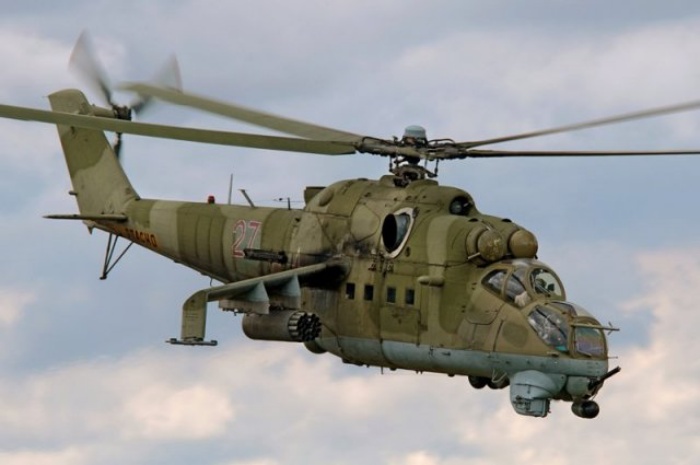News reports in the Russian media have said Russian officials do not blame Azerbaijan for the downing of a Mi-24 Russian military helicopter in last month’s clashes between Azerbaijan and Armenia. Instead, they hold responsible Turkey and the United Kingdom, which are perceived to be dissatisfied with the Russian-brokered ceasefire that put an end to the fighting in and around Nagorno-Karabakh.
The Russian helicopter was shot down on Nov. 9 by a portable ground-to-air missile near the Armenian village of Yeraskh, located near the Azeri border. It had taken off from a Russian military base in Armenia. Russia announced that it was downed in Armenian airspace and that two of its crewmembers died while one was critically injured.
A few hours later Azeri President Ilham Aliyev released a statement taking responsibility for the incident, apologizing and announcing that they were prepared to pay compensation. The Kremlin accepted Aliyev’s apology, and the ceasefire talks under Russian guarantee moved forward unobstructed.
Claims that the helicopter was downed to sabotage negotiations
The Strategic Culture Foundation, a well-known Russian think tank reportedly affiliated with the country’s foreign ministry, published an article by Vladimir Kudryavtsev examining the downing and highlighting the recently growing cooperation between Turkey and the UK.
According to the analysis, the UK has been using Turkey as a battering ram, especially for its designs in the Caucasus region, and Turkish President Recep Tayyip Erdoğan is happy to play the role. It also claims that Richard Moore, the new chief of Britain’s Secret Intelligence Service (MI6), was the architect of the close partnership between the two countries.
The article said with the support of Turkey and the UK, Azerbaijan gained significant ground in Nagorno-Karabakh and that Aliyev chose to strike a deal with Russia so as not to become further drawn into Turkey and the UK’s influence.
Kudryavtsev cited sources from the Kremlin, alleging that the Russian helicopter was downed with the aim of undermining the talks for a ceasefire by sparking a crisis between Baku and Moscow.
Moore visits Turkey after the ceasefire
MI6 Chief Moore had previously served as the UK’s ambassador to Turkey. He is known for being one of the most prominent backers of Erdoğan’s government in the aftermath of a failed Turkish coup attempt in July 2016. Moore paid a visit to Turkey on Nov. 11, immediately after the ceasefire deal was struck in Nagorno-Karabakh.
During the visit Moore met with Presidential Spokesperson İbrahim Kalın, one of the people closest to President Erdoğan. His preference for meeting with Kalın instead of his counterpart, Hakan Fidan, from Turkey’s National Intelligence Organization (MİT) was widely discussed in Ankara. However, Kalın is undisputedly one of the most influential figures in Erdoğan’s presidential palace.
According to reports in the Russian media, Moore successfully took advantage of the vacuum left by the US lack of interest in Turkey’s actions and developments in the region and transformed Turkey into a vanguard of British foreign policy.
Turkey’s military spending jumps amid involvement in regional conflict
In October, when the fighting in Nagorno-Karabakh was in full swing, Turkey’s military spending saw a significant surge. Throughout the month, Turkey made purchases valued at TL 1.6 billion ($175 million), more than double the country’s average monthly defense spending. Turkey brought to the conflict some 200 military personnel as well as high-tech equipment and armed drones.



